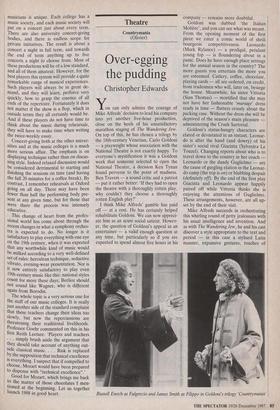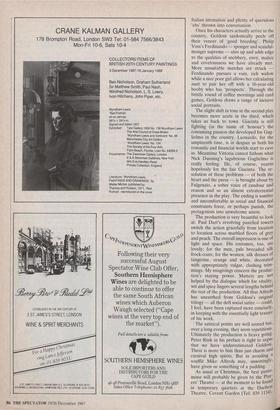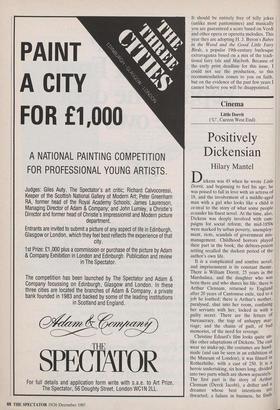Theatre
Countrymania (Olivier)
Over-egging the pudding
Christopher Edwards
You can only admire the courage of Mike Alfreds' decision to lead his company into yet another five-hour production, close on the heels of his unsatisfactory marathon staging of The Wandering Jew. On top of this, he has chosen a trilogy by the 18th-century Venetian, Carlo Goldoni — a playwright whose association with the National Theatre is not exactly happy. To everyone's mystification it was a Goldoni work that someone selected to open the National Theatre, a decision Ken Tynan found perverse to the point of madness. Ben Travers — a sound critic and a patriot — put it rather better: 'If they had to open the theatre with a thoroughly rotten play, why couldn't they choose a thoroughly rotten English play?'
I think Mike Alfreds' gamble has paid off — at a cost. He has certainly helped rehabilitate Goldoni. We can now appreci- ate him as an acute social satirist. Howev- er, the question of Goldoni's appeal as an entertainer — a valid enough question at any time, but particularly so if you are expected to spend almost five hours in his company — remains more doubtful.
Goldoni was dubbed 'the Italian Moliere', and you can see what was meant. From the opening moment of the first piece we enter a comic world of shrill bourgeois competitiveness. Leonardo (Mark Rylance) — a prodigal, petulant young fop — is floundering about in a panic. Does he have enough place settings for the annual season in the country? The more guests you entertain the more you are esteemed. Cutlery, coffee, chocolate, playing cards — all are ordered, on credit, from tradesmen who will, later on, besiege the house. Meanwhile, his sister Vittoria (Sian Thomas) — mortified that she may not have her fashionable 'mariage' dress ready in time — flutters crossly about the packing case. Without the dress she will be deprived of the season's main pleasure administering the Crush Sartorial.
Goldoni's status-hungry characters are elated or devastated in an instant. Leonar- do is after the hand (and dowry) of his sister's social rival Giacinta (Sylvestra Le Touzel). Changing reports about who is to travel down to the country in her coach Leonardo or the dandy Guglielmo — are the cause of gurgling elation in the Leonar- do camp (the trip is on) or blubbing despair (definitely off). By the end of the first play Giacinta and Leonardo appear happily paired off while Vittoria thinks she is enjoying the attentions of Guglielmo. These arrangements, however, are all up- set by the end of their visit.
Mike Alfreds succeeds in orchestrating this whirling round of petty jealousies with his usual intelligence and invention. And as with The Wandering Jew, he and his cast discover a style appropriate to the text and period — in this case a stylised Latin manner, expansive gestures, touches of Russell Enoch as Fulgenzio and James Smith as Filippo in Goldoni's trilogy `Countrymania'
Italian intonation and plenty of querulous `ehs' thrown into conversation.
Once his characters actually arrive in the country, Goldoni sardonically peels off their veneer of 'good breeding'. Philip Voss's Ferdinando — sponger and scandal- monger supreme — stirs up and adds edge to the qualities of snobbery, envy, malice and covetousness we have already met. More unsuitable matches are struck Ferdinando pursues a vain, rich widow while a nice poor girl allows her calculating aunt to pair her off with a 16-year-old booby who has 'prospects'. Through the brittle round of coffee mornings and card games, Goldoni draws a range of incisive social portraits.
The slight shift in tone in the second play becomes more acute in the third, which takes us back to town. Giacinta is still fighting (in the name of 'honour') the consuming passion she developed for Gug- lielmo in the country. Leonardo, for the umpteenth time, is in despair as both his romantic and financial worlds start to cave in. Meantime Vittoria cannot fathom what Nick Dunning's lugubrious Guglielmo is really feeling. He, of course, yearns hopelessly for the fair Giacinta. The re- solution of these problems — of both the heart and the purse — is brought about by Fulgenzio, a sober voice of candour and reason and so an almost extraterrestial presence in the play. The ending is sombre and uncomfortable as social and financial constraints force, or perhaps punish, the protagonists into unwelcome union.
The production is very beautiful to look at. Paul Dart's revolving panelled towers switch the action gracefully from location to location across marbled floors of grey and peach. The overall impression is one of light and space. His costumes, too, are lovely: for the men, pale brocaded silk frock-coats; for the women, silk dresses of tangerine, orange and white, decorated with appropriately vulgar, clashing trim- mings. My misgivings concern the produc- tion's staying power. Matters are not helped by the dialogue which for vitality, wit and spice lingers several lengths behind the rest of the production. All that Alfreds has unearthed from Goldoni's original trilogy — all the deft social satire — could, I feel, have been captured more concisely, in keeping with the essentially light texture of his work.
The satirical points are well scored but, over a long evening, they seem repetitious. Ultimately the production is heavy going- Peter Rink in his preface is right to argue that we have underestimated Goldoni. There is more to him than just charm and carnival high spirits. But in avoiding a soufflé Mike Alfreds may, unwittinglY' have given us something of a pudding.
As usual at Christmas, the best panto- mime will probably be given by the Play- ers' Theatre — at the moment to be found in temporary quarters at the Duchess Theatre, Covent Garden (Tel: 839 1134)' It should be entirely free of telly jokes (unlike most pantomimes) and musically you are guaranteed a score based on Verdi and other opera or operetta melodies. This year they are adopting H. J. Byron's Babes in the Wood and the Good Little Fairy Birds, a popular 19th-century burlesque extravaganza based on a mix of the tradi- tional fairy tale and Macbeth. Because of the early print deadline for this issue, I could not see the production, so this recommendation comes to you on faith, but on the evidence of the past few years I cannot believe you will be disappointed.












































































































 Previous page
Previous page